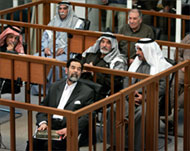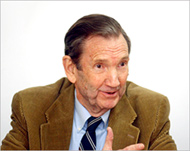Saddam argues with trial judge
Saddam Hussein argued with the judge and complained about Iraq’s occupiers as his trial for crimes against humanity resumed in a Baghdad court on Monday.

The deposed Iraqi president, carrying a copy of the Quran under his arm, arrived slightly late for the court session, the second in his trial and seven aides, which opened on 19 October then adjourned for 40 days.
“They brought me here to the door and I was handcuffed. They cannot bring the defendant in, in handcuffs,” Saddam said, when asked by chief Judge Rizgar Muhammad Amin to explain the delay.
He said he had to walk up four flights of stairs because of a broken lift in the heavily fortified courthouse.
“I will tell the police about this,” Judge Amin told him in the cool, polite tone he maintained during several tirades by the former president on the first day of the trial.
“I don’t want you to tell them, I want you to order them,” Saddam replied. “They are invaders and occupiers and you have to order them.”
Saddam’s rights
Saddam, wearing a white shirt and dark jacket, then argued with the judge about his rights and complained that his jailers had taken a pen and piece of paper away from him. As his voice rose heatedly, television footage of the proceedings broke away and the sound was cut.
 |
|
Saddam Hussein is charged with |
The images are being broadcast by Court TV, an American company, with a 30-minute delay to allow officials to interrupt the footage if anything they do not approve of is shown.
After the assassination of two defence lawyers shortly after the first court session in October, security for the trial was exceptionally tight. The TV footage is not showing the faces of any of the defence lawyers and only one of the five judges.
About two hours before the trial resumed, a mortar landed in the Green Zone, the area where the court is based. No one was injured.
Crimes against humanity
Saddam and his co-defendants are charged with crimes against humanity in relation to the death of 148 Shia men from the town of al-Dujail, north of Baghdad, after an attempt to kill him in July 1982.
Meanwhile, Aljazeera reported dozens of Iraqis demonstrated in al-Dujail on Monday calling for Saddam Hussein’s execution.
The protesters held pictures of their relatives, whom they have said were killed by Saddam’s regime figures.
Elsewhere, in Saddam’s hometown of Tikrit, hundreds of Iraqis demonstrated against the trial. Protesters held pictures of Saddam chanting slogans of support.
All defendants in the trial pleaded not guilty. They could be hanged if convicted.
The first hour of Monday’s session was taken up with procedural matters, as the defendants made requests to have more visits from relatives and Saddam complained about his rights.
|
“The court shows deep sorrow for what happened to the lawyers who were with us in the last session and now they are absent because of what happened to them” Judge Rizgar Mohammed Amin |
The defence lawyers also requested that the court stand to honour the two attorneys killed after the first session. A defence lawyer asked the chief judge that all should rise and read from the Quran as a mark of respect.
“The court shows deep sorrow for what happened to the lawyers who were with us in the last session and now they are absent because of what happened to them,” Amin said.
“The court believes that the best way to show respect to them is to ensure the conduct of a fair and public trial.”
US-funded trial
At least one of the defendants’ lawyers did not show up in court and the Iraqi High Tribunal, the US-funded body conducting the trial, said it would appoint an attorney for him.
The court rejected defence motions for a further adjournment of up to three months, and witnesses were expected to take the stand for the first time. The judge has said about 30 could testify, but only a handful were expected to appear on Monday.
Residents of Dujail told Reuters at the weekend that death threats had been made against some witnesses.
 |
|
Ramsey Clarke has joined the |
Ramsey Clark, a former US attorney-general, and a former justice minister of Qatar Najib al-Nuaimi were permitted to join the defence team as advisers in the courtroom.
Clark, a controversial figure who had advised Serbia‘s Slobodan Milosevic in the past, has said he intends to challenge the court’s legal status.
Nizar al-Samaraei, an Iraqi political journalist, told Aljazeera Clark’s presence in the trial may strengthen Saddam’s defence team giving it a better chance of turning the hearing into a legal trial, not a political one.
Security issues
Most of the 40-day break since the first session has been dominated by security issues after the murder of the defence lawyers. A third fled Iraq after death threats.
An Iraqi police chief told Reuters on the eve of the resumption that eight men had been detained and had confessed to plotting to kill the court’s chief investigator, Raed Jouhi.
Jouhi built the case against Saddam and has been the public face of the tribunal.
The 10 or so Iraqi lawyers still involved in representing the eight defendants agreed to return to court only after promises of undisclosed improvements in security were made.